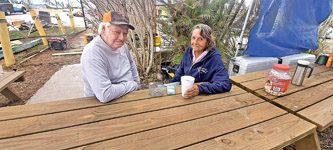<!–

Butch and Mary Lou Gay sit at the picnic table near their destroyed mobile home in Buccaneer Island in Matlacha. CRAIG GARRETT
Mary Lou Gay always had some sunshine in her back pocket. Even in dark times, it’s what some lucky souls come blessed with.
Raised in Cayo Costa, a barrier island and one-time fishing village, Mary Lou, 77, had survived other hurricanes, crawling from under buildings in one such storm.
What she had left in life was inside a mobile home in Matlacha’s Buccaneer Island, a park of two dozen such trailers just over the Matlacha Pass Bridge, most painted in pinks, purples and yellows. An older sedan and sun-faded Dodge truck were outside the single-wide trailer she and husband Butch shared.
A sister park, Dolphin Island, was much the same as Buccaneer, residents decorating their colorful places in mermaid artwork, crab-trap floats or “Gone Fishing” signs.
It was perfect, Mary Lou said, affordable lot rents and reasonable-for-Florida trailer prices of $40,000-$70,000, she said puffing a 305 cigarette and sipping black coffee in the days after Hurricane Ian had trashed Buccaneer and Dolphin parks. Lee County had just declared all but one or two trailers in both as destroyed, meaning that salvaging them was not likely. Wind and water had killed Mary Lou and Butch’s trailer.

Lulu Wilson with her dog near her Dolphin Island trailer in Matlacha that was wrecked by Hurricane Ian. CRAIG GARRETT
Thriving and happy parks became ghost towns in just hours of Category 4 winds, as if a water bomb had exploded, driveway gravel and lanais displaced by a smelly mud, trailers shredded or blown off their foundations, or gone completely. The marina next door was trashed, as well, boats on docks, others sunk. A Buccaneer man had died in the storm, authorities said.
Matlacha itself hadn’t done much better, businesses and homes blown to pieces or washed over in a sludge, the roadway a sinkhole and power poles snapped like bread sticks. St. James City experienced the same devastation, Bokeelia surviving with less damage, authorities had reported.
Yet, there it was, that hope peeking through in Mary Lou’s life. Even with little idea of what federal, state and local governments would do with Matlacha’s survivors, many still homeless after Ian leveled the town, she remained upbeat as is possible under such circumstances.
“Staying above ground,” she said, smiling outside a donated pull trailer that she and Butch now call home. “It’s all I can do … we’re all just trying to survive.”
Lulu Wilson had purchased her Dolphin Island trailer in January, excited to find an affordable place in a former fishing village that became quirky and fun, she said.

A makeshift “Island Time Begins Here” sign welcomes emergency crews and clean-up teams to the islands after Hurricane Ian. CRAIG GARRETT
“This was my home,” she said, arms folded and contemplating her single-wide now gutted by wind and water. “We just got … the bad luck.”
Like most living at both parks, Lulu Wilson and Mary Lou Gay were struggling with what to do and where to turn in Ian’s wake. Lulu had started removing her trailer’s interior, would strip it to the bones and likely rebuild, she said.
Mary Lou and Butch were less hopeful.
The problem, the three said, was what new standards would be imposed on mobile-home owners after Ian destroyed so much. And would trailer owners, many on fixed incomes or on working wages, be able to afford such repairs?
Those questions would need quick answers before money was spent on rebuilding, they said.
“I love this town, having the time of my life,” Lulu Wilson said of the days before fleeing from an approaching Ian. “I knew it would be bad. A neighbor said Ian’s knocking at the door. ‘Don’t let it in’ I said. It just sucks.”
At a picnic table with his wife, Florida native Butch Gay, a former commercial fisherman who had seen his share of storms, pondered a question about their possible future, their home trashed and now living in a small trailer with nothing to pull it.
“It is what it is,” he said, finally. “It’ll get back to whatever normal is.”
Until then, he added, “we’ll be with relatives, probably.”







